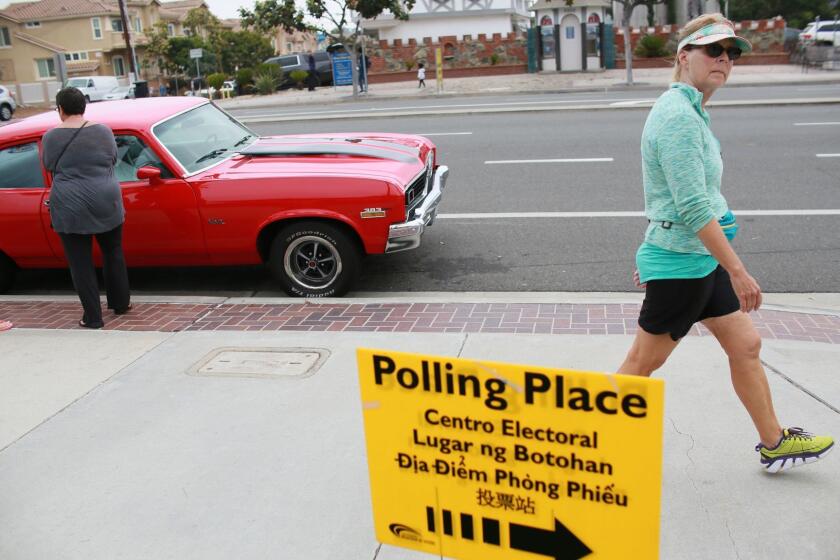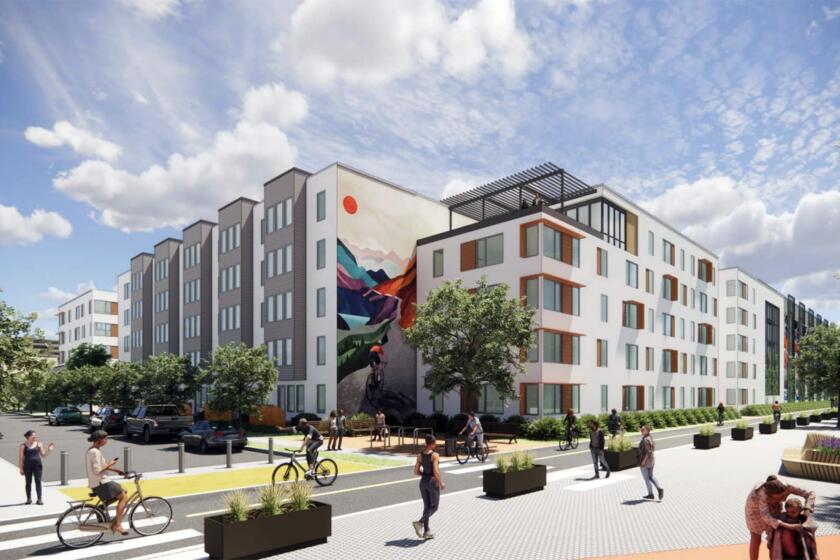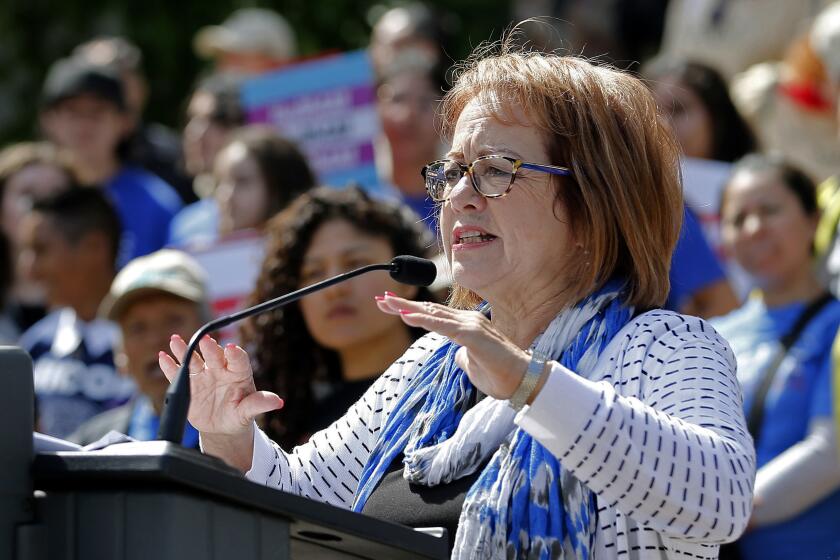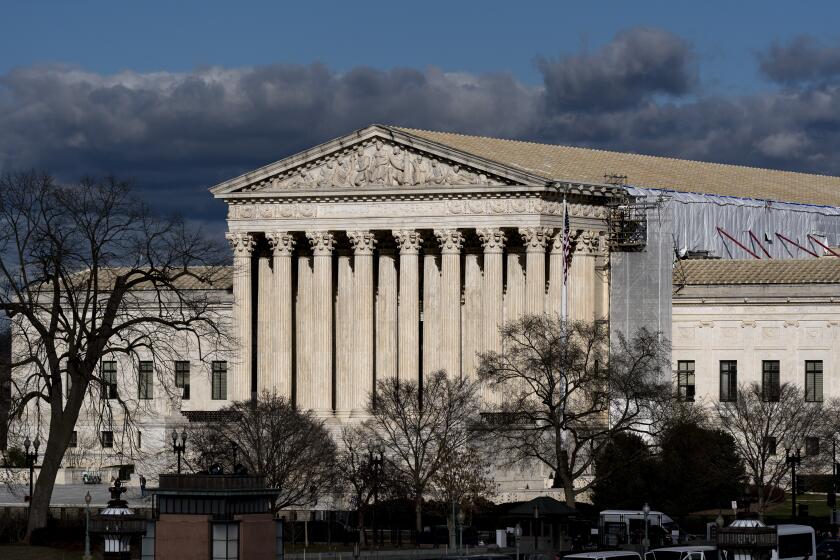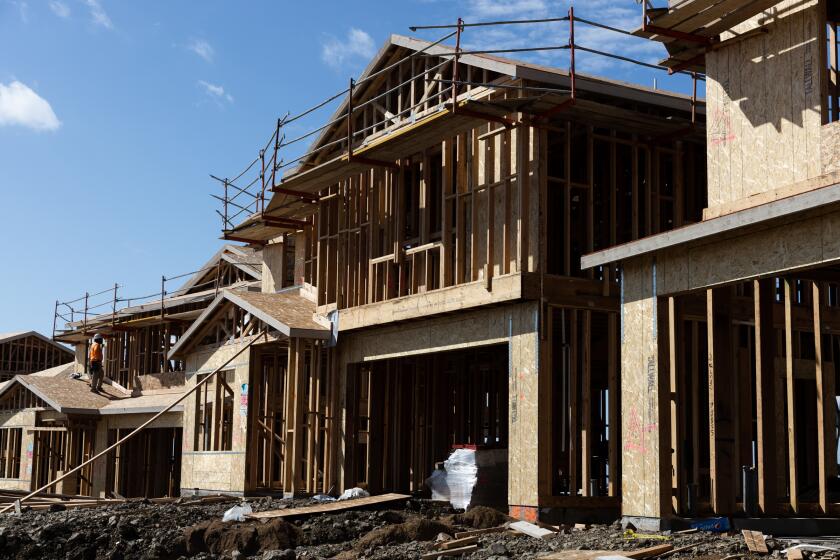Rocky Chávez becomes first Republican to enter open race to replace Rep. Darrell Issa
Rep. Darrell Issa’s announcement Wednesday morning that he would not seek re-election created a void in the coastal California district as Democrats saw the dynamic of their campaigns change in an instant and Republicans saw an opportunity to win a seat where voter registration leans in their favor.
The shake-up was rumored for months but the timing of the announcement from the Vista Republican was unexpected.
“I wish I could tell you that I saw this coming but it took me by surprise,” Democratic candidate Mike Levin said. “I was really looking forward to facing Issa-one-on one.”
Assemblyman Rocky Chávez of Oceanside quickly became the first Republican to announce he would run for the open seat. A former Marine, Chávez campaigned for U.S. Senate last year but left the race before the primary.
“It’s time we come together and focus on progress, not partisan politics and gridlock,” Chávez said in a statement announcing his decision. “We need to celebrate what unites us, not what divides us. This has guided my work in the State Assembly. And it will guide my work in Congress, where I’ll work for solutions that benefit us all as Americans — a strong economy, a strong military, rebuilding our infrastructure and protecting public safety and national security.”
Former San Diego Councilman Carl DeMaio is also considered a possible contender, particularly since he’s recently gained attention for his effort to repeal a state gas tax that funds transportation projects.
And Joshua Schoonover, a patent lawyer, said he’ll no longer run for the seat held by Rep. Duncan Hunter, R-Alpine, but has changed direction and is seeking the one Issa is leaving.
Diane Harkey of the state Board of Equalization has also been mentioned for a possible run.
“With a lot of Republican talent in North County and South Orange County, I have no doubt several well qualified candidates will emerge,” the chairman of the Republican Party of San Diego County, Tony Krvaric, said on Facebook.
Across the aisle, Four Democrats had already declared their candidacy, including Issa’s opponent in 2016, Doug Applegate, an attorney. Levin, an energy attorney, and real estate businessman Paul Kerr, and Sara Jacobs, the head of an international non-profit, are also running as Democrats and had so far campaigned not so much against each other but rather against Issa.
But while they no longer have Issa to attack, they said that the district still needs a Democrat to push against President Donald Trump.
“Our fight has always been not just to retire Issa, but ultimately to elect a replacement who will help take back Congress and resist the Trump agenda. The more this White House spins out of control, the more important it is for Congress to step up and do its job,” Jessica Hayes, chairwoman of the San Diego County Democratic Party, said in a statement.
The district stretches from La Jolla in San Diego and up the coast to Dana Point in southern Orange County. About 37 percent of voters are registered Republicans, while another 31 percent are Democrats and 26.5 percent do not belong to a party. While Republicans have a voter registration advantage, historically the party that controls the White House loses seats in Congress during the president’s first midterm election. In 2016 the district voted 50.7 percent for Hillary Clinton and 43.2 percent for Trump.
While Issa is leaving, the Democrats who are trying to replace him said their campaigns won’t change much. In statements and interviews on Wednesday, they said they’re running to oppose Trump and the GOP’s legislative agenda.
“We are still living in a time when healthcare is threatened, and the country has just passed a tax proposal that benefits, to a gross extent, the large corporations and the wealthy, and that comes at the expense of hardworking Americans,” Kerr said.
Jacobs, similarly, said that the campaign is about putting someone who will fight against Trump into the House of Representatives.
“This race was never about one person,” she said in a statement. “It’s about having representation for Southern California that puts our communities ahead of big oil companies and corporate interests. Voters here want someone who will stand up to Donald Trump, who represents them and their values, and who will work every day on behalf of them and their families.”
Applegate did not return a request for comment, but said that his election builds on his last campaign.
“Instead of even trying to defend his empty record of running lockstep with Trump, Issa decided to show all of the moral courage that we’ve come to expect of him: He gave up. Meanwhile, we continue the fight we started in 2016, for our progressive vision for CA-49,” Applegate said on Twitter.
Levin, who said he was confident that his latest campaign financing report and canvassing efforts will put him in the top-two in June’s open primary, said he’s confident that the district will remain active.
“There’s this policy war on California that this president and this administration, with the support of the GOP in Congress, is engaged in,” Levin said. “And as long as that’s the case, the progressive activist base is going to remain engaged.”
The top two candidates in the June 5 primary will face each other in the general election where, besides their representatives in the House, California voters will consider up-ticket races for governor and the United States Senate.
Twitter: @jptstewart
joshua.stewart@sduniontribune.com
(619) 293-1841
Get Essential San Diego, weekday mornings
Get top headlines from the Union-Tribune in your inbox weekday mornings, including top news, local, sports, business, entertainment and opinion.
You may occasionally receive promotional content from the San Diego Union-Tribune.


